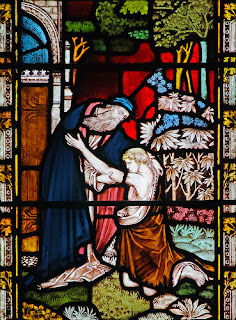 |
| Image by Lawrence OP |
I was searching through some old texts about Saint Martin of Tours, the 4th century bishop and monastic who’s probably best known for his impressive skill at slicing cloaks with a sword, and his very shoddy skill at hiding amid geese. And in amongst these writings, there is a longer piece, a biography of Saint Martin written by Sulpicius Severus
I’m not used to such things. Instead, I’m used to the underlying assumption that Satan is the ultimate face of evil, the father of lies, who can never reconciled, and can never receive forgiveness. Satan is doomed to die.
He prowls about, like a roaring lion, seeking those whom he may devour. He wages a war against God, humans his pawns, destroying souls from the inside out, and he takes a ghoulish, devilish pleasure in the cause. And, because he is beyond redemption, beyond forgiveness, beyond reconciliation, it’s okay to hate him. And, also, to rejoice in the someday, when he will be cast into a lake of fire and eternal torment.
 |
| Image by Master L. Cz. |
And so we live in fear of the devil. Or we gloat over his eventual, inevitable demise. Or we arm ourselves with our weapons of faith, prepared to fight and to overcome and to banish him. The church militant. Take no prisoners. Show no mercy. No mercy.
But when the devil confronted Martin, Martin offered him mercy.
“The devil met Martin and taunted him for accepting back several brothers who had lost their baptism by grievous error or sin, but who now sought repentance; he listed their crimes, one by one, in Martin’s hearing. Yet Martin replied that one’s past sins are cleansed when one turns again toward life, and that, through the mercy of God, those who have given up their evil ways are absolved.
“But the devil persisted, saying that men as guilty as these did not even near the pale of pardon, that no mercy was extended by the Lord to those who had once fallen away.
 |
| Image by Rembrandt Harmenszoon van Rijn |
And that’s it. It’s just left hanging there. No response. No reply. And I’m not sure what to do with it.
I don’t know, sometimes, what to do with these words I use about God, this belief that God is love and redemption and reconciliation. I don’t know just how far to stretch them. I don’t know if I believe in a Christ who came to bestow mercy on the world, the whole world, a God at work to reconcile all things, all things, until they are again, God and them together, one.
Sometimes I don’t know how far mercy extends. But maybe Martin was right. Maybe that old throwaway line, about the gates of hell not standing against the church… maybe it means that the gospel of reconciliation will not only be taken to all nations and all tribes and all tongues, but will break through the gates of hell itself and… I don’t know… do something? Do what exactly?
Maybe it means, just maybe, that Christ’s mercy extends even to the devil. Maybe one day the devil will even accept it. And what then? I wouldn’t know what to do with that either.
 |
| Image by Ted |
Sebastian Faust is an ante-orthodox thinker and writer, self-styled canary in the coal mine of pop culture. He paints with light, builds castles in the air, and lives a life rather ordinary in Nashville, Tennessee. He holds the position of Dauphin at On Pop Theology. You can’t follow Sebastian on Twitter because he doesn’t understand technology, but he appreciates hand-written notes sent by post or well-mannered carrier pigeon.
You can, however, follow On Pop Theology on Twitter @OnPopTheology or like us on Facebook at www.facebook.com/OnPopTheology. And if you'd like to support what we do, you can donate via the button on the right of the screen.
You might also like:

No comments:
Post a Comment